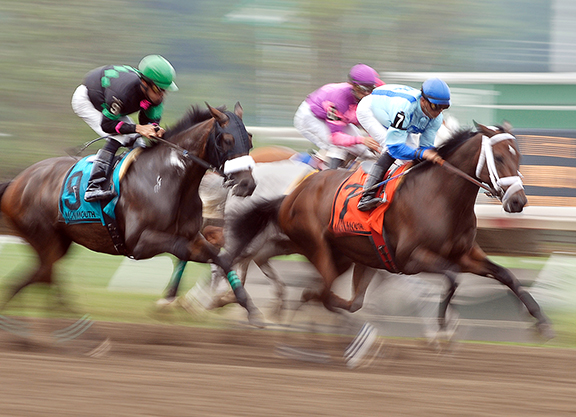By Jen Roytz
In horses, humans and all other mammals, the heart is responsible for delivering oxygenated and nutrient-rich blood throughout the body and removing metabolic waste through a vast network of blood vessels, therefore any disruption in this process can have detrimental effects.
In horse racing, and most other equestrian sports, the term “heart attack” has become a catch-all phrase for suspected fatal cardiac events, as was the case recently with the passing of G1 Dubai Golden Shaheen winner XY Jet (Kantharos), who died of an apparent cardiac event the morning of Jan. 8.
While in humans a heart attack, or myocardial infarction, is commonly the result of a loss of blood flow (clogged arteries) which damages part of the heart muscle, in the equine the scenario is much different. As such, it is exceedingly rare for a horse to suffer a “heart attack” in the truest sense of the term, however horses can still be at risk for other heart-related maladies.
While sudden death due to a cardiac event is rare, especially in horses of racing age, it is not out of the realm of possibility. The types of heart disease most often associated with equine deaths include electrical irregularities (cardiac arrhythmias), heart valve defects (murmurs), congenital defects, aortic rupture and inflammation or degradation due to illness or toxins.
Equine veterinarian Dr. Foster Northrop, DVM, who practices primarily on Thoroughbred racehorses at Churchill Downs, Keeneland and Palm Meadows, offered his insights to help give clarity to what are often referred to as “heart attacks” in horses.
“Heart attacks in humans are caused by blockage of the coronary arteries,” said Northrop. “This does not happen in horses. Rather, sudden death in horses relating to the heart is usually an aortic arch rupture or an electrical event, such as a rhythm deficiency, like atrial fibrillation. Valve deficiencies also may be a factor in heart deaths in horses.”
While aortic arch ruptures are in general uncommon, if and when they occur it is more often in 2-year-olds, according to Northrop. In such instances, the horse often has a previously undiagnosed defect in the aortic arch that, once they are working at or near sustained maximum exertion for the first times in their lives, becomes compromised. Once the aorta–the largest artery in the body–ruptures, the horse's blood pressure falls rapidly as blood rushes uncontrollably into the chest cavity. While this is often a massive and near-instantly fatal event, it is possible in rare cases for a horse to experience a smaller rupture and experience a steady decline in blood circulation over the course of hours or days.
Another type of cardiac event that can result in sudden death in a horse is an arrhythmia, or abnormal heartbeat, which can cause the heart to stop suddenly. Arrythmias are often triggered by adrenaline, such as when a horse's heart rate is elevated during morning exercise or racing. The risk of such events can increase in extreme heat, which exacerbates the potential for arrhythmias due to calcium loss through excessive sweating.
While an aortic rupture can be identified in a necropsy, arrythmias are electrical events that do not leave visible effects on the heart muscle itself, so often a definitive diagnosis is hard to make.
There are also chronic diseases of the equine heart that may not result in sudden death, but can significantly impact a horse's athletic capabilities, quality of life, and over time can be fatal. These include birth defects to the heart's valves, chambers and blood vessels; previous heart issues; cancer; or disease in other organs which in turn compromises blood flow in and out of the heart. Over time such ailments limit the heart's ability to pump oxygenated blood throughout the body and lead to heart failure.
“There are no routine tests that I know of that will predict aortic issues, however listening to a horse's heart with a stethoscope will pick up on murmurs associated with valve issues,” said Northrop.
Examining a horse's heart with a stethoscope on both sides of the chest to listen for abnormal sounds (murmurs) and performing a calculation of rate are an important baseline assessment of cardiac health. Sometimes findings in such exams, combined with outward signs such as unexpected fatigue or exercise intolerance, can lead to recommendations for diagnostics, such as an EKG or ultrasound to identify at-risk horses.
Just as with humans, exercise during extreme heat or other types of extreme stress can increase a horse's risk for a fatal cardiac event, as can illness or disease elsewhere in the body. Age can also play a role, as an animals heart, lungs and other organs gradually decrease in functionality and arteries can lose elasticity, which could lead to an increased risk of aortic rupture in theory, however the age at which even older horses compete on the racetrack is still relatively young when compared to a horse's average life span.
“Excessive stress, such as heat or other factors, can always increase risk,” said Northrop. “Age can factor in, as can fitness. Extreme exercise in an unfit horse could put the animal at heightened risk.”
Not a subscriber? Click here to sign up for the daily PDF or alerts.






